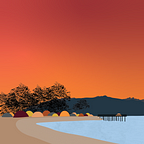Press release: CRAB Park moving day — Cramped parking stalls and eviction by attrition
Unceded xʷməθkʷəy̓əm (Musqueam), Swx̱wú7mesh (Squamish), and səlil̓ilw̓ətaʔɬ (Tsleil-Waututh) territories, April 4, 2024 —
Dozens of rangers, law enforcement and outreach workers are preparing a dystopian parking lot style encampment, with a gravelled base and almost-touching parking spots.
The newly-created parking lot in CRAB Park is a far cry from the Port of Vancouver parking lot next door, which tent city residents have proposed as a spot for a resident-run tiny home village.
The new “sanctioned camp” has only enough spots for 27 people, based on an obscure “list” referred to by Park Board representatives — despite the fact that the Park Board does not have authority to collect personal information.
Encampment residents report that rangers have stated that if someone leaves their tent for even one day, the tent will be removed and the space closed off.
There are 4,821 people in Greater Vancouver according to the 2023 Homelessness Count — a 32% increase over the previous count.
“It’s because of their failed system that we are homeless, that it exists. So when the creators of the failed system are trying to strong arm and fail to engage with the people,” says CRAB Park resident D, commenting on the sham consultation that led to the camp’s “clean-up” and the need to keep spaces open. “It’s not like a rental hostel where there’s certain days. You don’t know when you need it. It needs to be there for when people show up.”
The new “design” was done without consultation, and the cramped quarters have shocked the residents.
“The tents are really cramped and close together. There are so many reasons why it’s a problem. One of them is that a lot of people have anxiety and PTSD and don’t want to be so close to their neighbours,” says CRAB Park resident T. “And I don’t want to keep my dog in a 10x10 space.”
Residents have felt increasingly marginalized by the lack of consultation that fails to acknowledge the contributions of those with lived experience.
“We did everything ourselves. No budget no money no resources. And then they marginalized us by shutting off the electricity, limiting the water,” says reside A. “This is an address. And has been a place of residence. The park board has job descriptions that don’t even apply and how did they got access to this kind of money and not include us? They don’t have anything to do with DTES and their jobs aren’t even remotely taking care of this type of position. They’re not equipped. They’re doing way more harm than good.”
The Park Board has declined to include access to water and electricity on the new site, although these are the subject of a current Human Rights complaint and the Park Board has previously stated that it could only provide such services if the camp was “cleared” (as it was last week during the “clean-up”).
Park Board have also indicated that they will not include the large communal tent. Residents have commented on reasons why the large communal tent is important:
- In the current opioid crisis, it is a shared using space and contains harm reduction supplies. CRAB Park has a VCH-funded peer-witnessing program and the peers often monitor the space in the community tent.
- The community tent has existed for two years and has a lot of sentimental memorials (hand drawn artwork) for lost friends inside.
- It’s essential for community-building. The First Nations Leadership Council statement condemning the Park Board plan, refers to “rights to communal gathering” (Full letter here: https://www.bcafn.ca/news/fnlc-calls-vancouver-park-board-halt-planned-eviction-crab-park)
- The current tent is larger and better built than the small lower-quality tent being offered to replace the kitchen. Insulation and sturdiness are important in windy spring weather by the ocean
- It’s like an urban longhouse and gathering place. If there are 27 people, there needs to be room for 27 people to gather.
As the moves unfolds, new draconian Park Board bylaws restricting homelessness and sheltering in parks may become law by next week.
This comes just a month after the Federal Housing Advocate released a national report on encampments, stressing the need for empowerment and autonomy for encampment residents, meaningful engagement, clean drinking water on-site, and ensuring the police do not play a role in encampments.
“Last year you helped me intensely. I was at a real dark place in my life. You took me in, gave me a plot of land that saved my life. You basically granted my asylum.” — Resident K
There are currently about 30 tents at CRAB Park.
Media etiquette: Please remember that a tent is a home and be respectful of personal space
Media contacts
Fiona Y, advocate 604–251–6164
Ryan S, supporter 778–668–1645
Michelle G-C, (médias francophones), 604–817–7668
Residents may be available upon request
